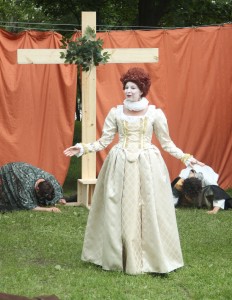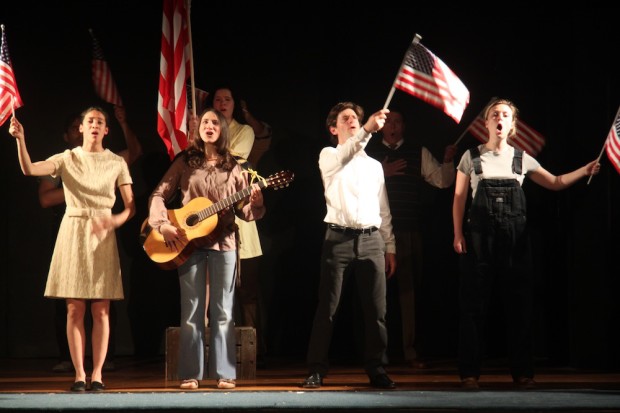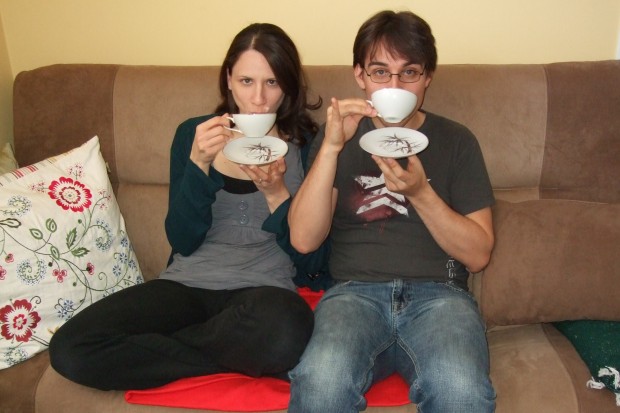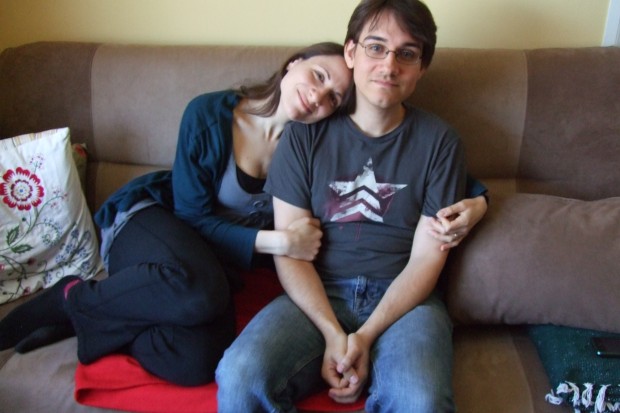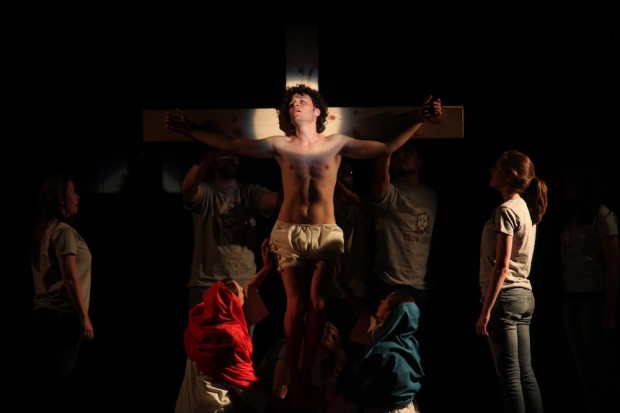
Andrew Kushnir with Julie Tepperman, Mayko Nguyen and members of the Ensemble in Passion Play. Photo: Keith Barker
The Canadian premiere of Sarah Ruhl’s Passion Play begins tonight! Produced by a tryptic of indie theatre companies Outside the March, Convergence Theatre and Sheep No Wool, Passion Play explores the collision of religion, politics and theatre and the impact playing iconic biblical roles has on individuals and communities. Outside the March’s Katherine Cullen explores the meaning of the word ‘passion’.
The word Passion is an ambivalent word. It has a few somewhat contradictory meanings. According to ye olde, Online Etymological Dictionary Passion can mean the following:
Passionate (adj.): “early 15c., “angry; emotional,’ from Medieval Latin passionatus “affected with passion,” from Latin passio. Specific sense of “amorous” is attested from 1580’s. Replaced Old English polung, literally “suffering” from polian (v.) “to endure.” Sense of “sexual love” first attested 1580’s; that of “strong liking, enthusiasm, predilection” is from 1630’s.
Suffering, pain, emotional, desire, love. That’s a real cross to bear for one word. Its various meanings bring forth a varied pallet of human emotions that speak to a duality of experience. It is possible that the word Passion contains in it, then, a promise of what it means to be human: to live in a state of utter ambiguity and vulnerability.
In many ways, Sarah Ruhl’s Passion Play explores this social and historical drive of human beings to eradicate this ambiguity from our experience. One way to clean up the mess of human nature is to impose rules and order through various ideologies (organized religion, monarchy, political systems), icons (Jesus, Queen Elizabeth), and leaders and dictators (Hitler, Ronald Reagan). That way we don’t have to feel our passionate discomfort. To be told how to think and act can be easier than thinking for yourself.
To legitimate and sanctify only certain modes of being closes down the countless ways that we perform our humanness. There is a massive ethical price to be paid for the eradication of our inner diversity. Some of the characters in this play step outside the boundaries of arbitrary power and pay for it with their sanity or their lives.
For such an epic play, the show has a real humility to it. For one, it is very funny and never takes itself too seriously. There is a lot of room for humor when people are trying to fulfill roles they are not suited for. Maybe it is in these moments of laughter where ambiguity can live unencumbered by our desire to separate the black from the white.
On a personal note, this play reminds me of being a child. Child-logic is different from adult logic. I remember accepting all kinds of ridiculous notions to be true (i.e. imagining that if I held my breath I would become invisible and could eat as many cookies as I wanted with my mom in plain sight. Didn’t work out the way I planned). I miss that way of thinking, even if it didn’t get me the results I wanted.
In the world that Sarah Ruhl has imagined, there are “big beautiful fish puppets” that carry people off in “enormous boats.” It reminds me of lullabies and bedtime stories. It reminds me that dreamland can merge with reality, and magic feels strangely possible. Maybe this is the place where we are best equipped to handle ambiguity.
Passion Play runs June 6-30th. For tickets visit: outsidethemarch.ca
]]> On the menu today: Croissants, scones, hummus, pita and dark chocolate.
On the menu today: Croissants, scones, hummus, pita and dark chocolate.
by Melissa D’Agostino
It’s been a while since I’ve held a tea with some fine, theatre-folk, so I’m happy to bring you the second installment of Tea with D’Agostino. In this edition I sit down with Julie Tepperman and Aaron Willis, co-Founders of Convergence Theatre, and husband and wife in this crazy game called life.
Convergence Theatre engages like-minded emerging and established theatre artists to create original, intimate and memorable experiences for a broad audience. Since 2006, the company has ‘converged’ with over 75 artists in the city to bring us Autoshow, The Gladstone Variations, and the currently remounted Yichud (Seclusion) at Theatre Passe Muraille. Aaron and Julie are also active teachers in the community and in the school system.
On Teachers and Teaching:
Julie: I was at this elementary school a couple of weeks ago—and I had this one grade 6 class with a male teacher. The guy was, you know, our age and wearing a really cool t-shirt. Does not greet me. I find the classroom and I’m like, ‘Oh hi, I’m Julie—‘ and he mumbles and he says ‘Walk with me this way’, and I follow him with all the kids to this drama room, and then there’s no key, and he’s upset about it. Then we finally get into the room and this there’s a couch in the corner, and I say, ‘You’re welcome to join the circle and participate’ and he goes, and sits on the couch, takes out his iPhone to play with it and then falls asleep.
Melissa: When I was in grade four in Catholic School, I had this teacher named Mrs. Sheardown.
Aaron: Hahaha. Sounds like a character in a restoration comedy.
Melissa: Exactly! And she would show you how to say her name—like break it down. Shh. Ear. Down. As if it’s the hardest name to say, ever. And she would sit at this student’s desk in the middle of the portable with a bell, and just ring the bell whenever you irritated her. And you’d have to recite In Flanders Fields by memory and if you tripped up she’d humiliate you.
Aaron: It’s like a Charles Dickens novel.
Melissa: You have no idea. Well…part way through the year she had to get her hip replaced, and we got this substitute teacher fresh out of teacher’s college. Mr. DeRose.
Julie: Great name.
Melissa: Oh yeah. He was gorgeous—he looked like Elvis and he wore biker boots, and basically we could do anything we wanted. We would play soccer baseball all morning—
Aaron: I LOVED soccer baseball!
Melissa: I know! He would play chess tournaments with the boys, but never the girls.
Julie: Was that a rule of his?
Melissa: Yep. Girls weren’t allowed to play. I think he wanted to hang out with the boys and he thought all the girls had crushes on him.
Julie: Ah yes.
Melissa: And he used to make us play this game called Duck Hunt, where you would have to walk across the blackboard one at a time and he’d whip tennis balls at us to try and hit us, and you weren’t allowed to duck—you were only allowed to move forward or back or walk faster.
Julie: What? Did people get concussions?
Melissa: No… just minor bruising. And then one day, he brought in his guitar because we were doing a unit on sound and instruments. And he says, ‘Okay, kids, I want to introduce you to my favourite band—The Sex Pistols.’ And he unbuttons his shirt and he’s wearing a Sex Pistols T-shirt.
Julie: No!
Melissa: Oh yes. And then he plays us the song Abortion—which is really a song called Bodies, but it’s about Abortion. ABORTION. In my fourth grade, Catholic School, portable classroom. And I don’t know if you’ve ever heard that song, but the lyrics are pretty much: She was a girl from Birmingham/She just had an abortion. Dragged to a table in a factory…etc, etc.
Aaron: Wow.
Melissa: And I think we were all so shocked that it was happening that none of us went up to our parents and said, ‘Guess what? Mr. DeRose played us an abortion song today’.
Julie: Do you know what happened to that teacher, Melissa? Did you ever see him again at school?
Melissa: I’ve never seen him since then.
Julie: You should put a shout out.
Melissa: Ha. I should.
Julie: I mean…we have all these memories. And we were quite young when some of these things happened. And I wonder if these teachers would be shocked to hear our memories of these stories played back, how they remember them—if they remember them at all. It just proves that what you do has an impact.
On Diego Rivera & Being Lost in Detroit:
Julie: In November we were in Michigan teaching Shakespeare in High Schools. And we were obligated to go one afternoon to a luncheon with these members—
Aaron: These are all the rich donors—
Julie: Our grandparents’ age, mostly, who give money to the company we work for, and support this education program.
Melissa: Okay.
Julie: So they have couples who come pick us up at the hotel and drive us downtown into Detroit, now what’s so funny is that none of them live in Detroit, they all live in the Burbs, which is where the hotel was, so they all got lost, they didn’t know where they were going.
Melissa: Lost in Detroit?
Julie: Lost in Detroit.
Melissa: I’ve been lost in Detroit. At night. In a cab. It’s not fun.
Aaron: Scary.
Julie: So we go—it was actually at a gorgeous museum—
Aaron: The Detroit Institute of Art.
Julie: Right, the DIA. And before lunch, the couple who drove us, they’re nice enough, and they say, before lunch you have to let us take you to this mural. It’s the –I can’t remember his name. Frida Kahlo’s husband at the time—
Melissa & Aaron: Diego Rivera.
Julie: Yes. Was commissioned to make a gigantic mural of the workers. So he took us there—
Aaron: And what was cool is they got a docent to give us a talk about it. And she was telling us the story of the mural, and the things he did, because he was an ardent socialist, and—
Julie: He put himself in the mural—
Melissa: He often did, yes, and other historical and socialist figures.
Aaron: And so there’s a lot of stuff about the Ford factories, and there is a black man front and center working on the floor.
Julie: Which was very controversial—
Aaron: –because Ford never had a black man working on the floor. He also had Ford sitting at his desk next to a bunch of pipes which looked like a big ear, alluding to the fact that Ford would have people on the floor listening to people talking about unions.
Julie: And then she leaves…
Aaron: and they’re walking back, and this guy felt the need, very strongly, to defend Henry Ford. I don’t know if he knew we were Jewish, or not.
Melissa: Okay.
Aaron: You know, because Henry Ford is so famous for anti-Semitism.
Melissa: Yes.
Aaron: But he was basically saying, ‘You know Ford did a lot of great things’. He was doing all those mental contortions…
On Criticizing Israel & Judaism:
Aaron: Well our times running out here.
Melissa: I know. I wanted to talk more about Jewish things.
Julie: Like his conversion?
Melissa: Yes—because you converted to Judaism, right Aaron?
Aaron: Yes. And we didn’t get into Jews and Israel.
Melissa: Well, I thought about that question, and then I thought ‘That’s going to take over because that’s a huge question’.
Julie: This idea of Tikkun Olam, which is Hebrew for ‘Repairing the world’, and it’s something that—it’s a Jewish value, but it’s a human value. Because we’ve come up against older people in our lives who’ve said, ‘You know…as a Jew, you just have to vote for the candidate that supports Israel’. And that’s so infuriating to me. We live here. And it’s lip service! It’s total lip service! Just because you criticize Israel doesn’t mean you don’t support it.
Melissa: A thing I’ve noticed in the world is that we’re living further and further away from living in a real context—a communal context. Everything is being taken out of context. When you start divorcing one ideal from the rest of your ideals, or from your community or the world, you start making decisions that are incomplete.
Aaron: Totally.
Julie: And it doesn’t actually mean anything—what does it mean to ‘support’ that country? Does that mean if there’s a war you’ll send troops? Will you…what will you do?
Melissa: Yes, I suppose it means if there was a war, that Canada would be on Israel’s side.
PAUSE
Julie: It means nothing to me.
Melissa: I know. But it’s also all in the context of war, and money and politics on a level that I don’t really think about on a daily basis. I don’t use that as a context to negotiate my values—like, ‘If there was a war, how would I feel about that? ‘
Aaron: No, in fact, really it’s about what about today, now? What are the problems happening here, now?
Melissa: Yes! And what can my leaders do to make things better. Here. Now.
You can catch Yichud (Seclusion) at Theatre Passe Muraille from May 21st to the 29th, and then at the Magnetic North Theatre Festival from June 3rd to the 6th.
Melissa D’Agostino is an award-winning actor, writer, singer and producer. She also likes tea. Check her out at www.melissadagostino.net
]]>
As first reported in The Toronto Star, The Harold Green Theatre Company has pulled $50,000 in funding seven weeks befrore the curtain of the Convergance Theatre production of Yichud/Seclusion at Theatre Passe Muraille, after a major funder got a hold of the script and decided “the material might be misconstrued”.
In a scathing article on NOW Daily yesterday, Susan G.Cole called into question the ability of the company to remain artistically relevant in the wake of that decision:
I want to be clear. A Jewish theatre has the right to program material that it believes meets its mandate. Similarly, a gallery has the right to curate what it believes is consistent with its values – and I’ve said as much with relation to the Koffler’s decision to abandon Katz
But if Jewish artistic institutions narrow their vision in such a way that Jewish artists cannot produce thoughtful work probing the situation in Israel or in Orthodox Jewish homes or anywhere inside the Jewish community, exactly what kind of art do they think is going to get produced. And do the folks at Harold Green really think that, after this debacle, Jewish playwrights who matter will even consider affiliating with the theatre?
Maybe it’s time for Jewish theatre artists to establish the company we deserve – the Harold Green Jewish Theatre isn’t cutting it.
Next up for the Harold Green: a December 15th deadline for playwrights to submit to “In The Beginning: A Jewish Playwright Festival” which “aims to open the door for groundbreaking Jewish voices that challenge the Jewish perspective.” Note to playwrights – groundbreaking and challenge may not have the meaning you are used to in this context.
Meanwhile, Passe Muraille and Convergence have managed to salvage their co-production with some amazing fundraising, but they had to cut a full week of rehearsals to make the new smaller budget fly. They’re still fundraising in an effort to get back that key week you need to make good art great.
You can make a donation though Canada Helps here.
(Under Fund/Designation select: Help Convergence Theatre)
]]>